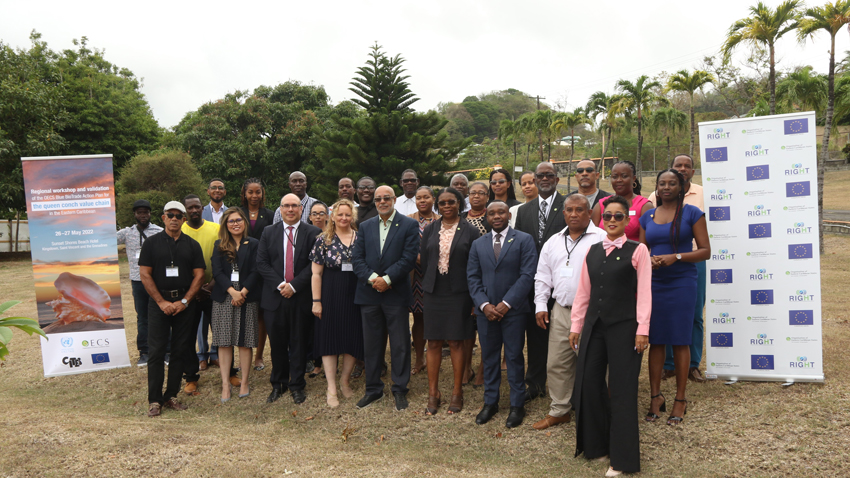UNCTAD in collaboration with the Organisation of Eastern Caribbean States (OECS) and the Convention on International Trade in Endangered Species of Wild Fauna and Flora (CITES) with the financial support of the European Union through the RIGHT Programme launched a regional project titled "Seizing the trade and business potential of Blue BioTrade products for promoting sustainable livelihoods and conservation of marine diversity in selected OECS countries (Blue BioTrade project)" in October 2020.
The project aims to empower small scale coastal operators from Grenada, Saint Lucia and Saint Vincent and the Grenadines (project beneficiaries) to produce and trade queen conch products in domestic, regional, and international markets under the Blue BioTrade environmental, social and economic sustainability criteria, including CITES.
The project contributes to achieving key targets of Sustainable Development Goal (SDG) 14 and 15, whilst also addressing key economic, environmental and social objectives of the OECS Development Strategy 2019-2028 and supporting recovery in a post COVID-19 scenario.
Key issues
Queen conch (Strombus gigas) is a highly appreciated seafood delicacy with important non-food uses, including therapeutical products and handicrafts. Whilst global demand is booming, small-scale coastal producers in the Eastern Caribbean do not fully seize the opportunities offered by sustainable conch markets. In many locations, early uncontrolled harvesting has resulted in overfishing, illegal landings and a rapid deterioration of endowments. Supply-side issues include the absence of traceability systems, limited landing and trade evidence, poor understanding and use of CITES processes and permits, lack of common handling practices and sanitary standards and a low level of associativity of fishers. From a trade perspective, limited access to markets – in particular international buyers - and the absence of certification schemes for producers are major challenges ahead. In this context, the project aims to empower small-scale coastal producers to produce and trade queen conch products sustainably through the application of apply the Blue BioTrade Principles and Criteria (for the marine environment).
During the Phase 1 of the Blue BioTrade project, three country case studies focusing on stakeholder-owned value chain assessments in Saint Vincent and the Grenadines, Grenada and Saint Lucia have been produced. These reports, as developed by UNCTAD in collaboration with CITES and the OECS, have analysed and identified stakeholder capacity to identify sustainable and gender-inclusive business opportunities and put forward recommendations on how to implement the Blue BioTrade Principles and Criteria in the queen conch value chain to ensure that small-scale coastal producers within and outside beneficiary countries benefit from enhanced sustainable production and trade opportunities in the queen conch value chain.
Objectives
Drawing from research and evidence from each country study, the Regional Blue BioTrade Plan of Action Validation Workshop aims to:
- Serve as a platform to take stock, exchange experiences, address existing bottlenecks, and explore options and country priorities to implement Blue BioTrade in the Caribbean.
- Mainstream research findings and evidence-based policy solutions globally and serve as a basis for delivering tailor-made capacity-building activities in the three beneficiary countries. Present Blue BioTrade opportunities for each country study and highlight cross-country lessons learned under phase 1 of the project.
- Present, propose and discuss the draft Blue BioTrade regional plan of action and key recommendations developed in the country studies for stakeholders’ inputs.
- Present and propose the revised Blue BioTrade regional plan of action and key recommendations for the validation of the stakeholders.
- Validate the Blue BioTrade regional plan of action to conclude Phase 1 of the Blue BioTrade Project.
- Present Phase 2 of the Blue BioTrade Project as a contribution to the implementation of the OECS Blue BioTrade Plan of Action.
Due to current COVID-19 travel restrictions, this event will be held in hybrid format - the in-person attendees will be welcomed by the Ministry of Agriculture, Forestry, Fisheries, Rural Transformation, Industry and Labour, Saint Vincent and the Grenadines at Sunset Shores Beach Hotel in Kingstown, Saint Vincent and the Grenadines and the remote participants will be joining via Zoom.


